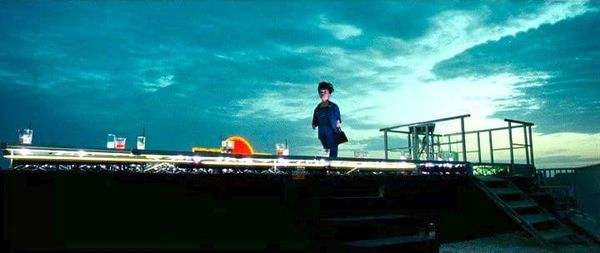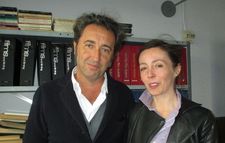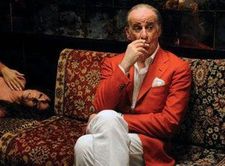 |
| Paolo Sorrentino: "The pool above him is in his imagination. You have a wilder imagination than I do." |
When I arrived for my conversation with Paolo Sorrentino about his mysteriously spellbinding tale The Great Beauty (La grande bellezza), on the table in front of us was a film magazine cover with Leonardo DiCaprio and Carey Mulligan for Baz Luhrmann's The Great Gatsby.
Sorrentino presents the beauty of Rome through a society, sacred and profane, that exhibits shameless emptiness and profound fruitless energy with the commanding Toni Servillo starring as ex-novelist turned high society columnist Jep Gambardella. "I was a sprint-style writer," Jep defines himself. All talking, all dancing, all deception, with an enraged little girl (Francesca Amodio) making art in public, a talkative Cardinal (Roberto Herlitzka) who obsesses about cooking and used to be "Europe's best exorcist", Arturo (Vernon Dobtcheff) the magician with his giraffe, flamingos, Fanny Ardant, and tourists who drop dead from the sheer beauty of it all.
Anne-Katrin Titze: What did you think of The Great Gatsby?
 |
| Paolo Sorrentino told Anne-Katrin Titze: "Gatsby does the parties because he wanted a woman. And in my movie it's the opposite." Photo: Lilia Blouin |
Paolo Sorrentino: I don't know. I don't know. I just saw it a couple of days ago. It's a great show, a big show. He describes very well the geography of the city and the suburbs. It's interesting. I was very impressed because I am not able to make that movie.
The Great Beauty is based on a story by Sorrentino.
AKT: You have some party scenes that might be comparable in extravagance but nothing else. Jep Gambardella (Toni Servillo) has the line "he wanted to be king of the high life" and "he wanted to be someone who could make a party a failure". This is probably the exact opposite of Gatsby's intention, no?
PS: Gatsby does the parties because he wanted a woman. And in my movie it's the opposite. It's true.
AKT: I would like to start with the voyages, and the journeys going nowhere that you map out for us. I was thinking of location and destination in your movie. You begin with a Céline quote, the start of his Journey To The End Of The Night about the imaginary travel. In a party scene about a conga line train someone says "our trains are the best - they go nowhere." On the other hand you have the migrating birds and the nun crawling up the stairs on her knees. Can you talk about the relationship of these movements?
 |
| On Toni Servillo as Jep Gambardella: " It is an appointment with the highest moment of his youth, his adolescence and of his purity." |
PS: Yes, in the film apparently there is no destination. People are floating over life. Apparently, they are always still in the same place. They're destined to go nowhere. However, the protagonist, without even realizing it, is moving toward a very precise destination. It is an appointment with the highest moment of his youth, his adolescence and of his purity. So the destination is specifically indeed those cliffs where he ends up meeting the young girl. The love of his life when he was a young man.
AKT: She is the one who died, yes? The one who split up with him in September 1970?
PS: Yes, she is the one.
AKT: The neighbor upstairs is a mysterious figure. Jep, who reached the height of his artificial position still has to look up to him, a criminal. Also, he sleeps underneath the pool. Did you construct a vertical visual hierarchy there?
PS: The pool above him is in his imagination. You have a wilder imagination than I do. I never really specifically thought about the hierarchy based on the physical position. The neighbor upstairs happens to be a criminal but if he was some kind of high executive in a corporation it would be the same thing. It reflects the feeling that a lot of us have that the world seems to be divided into types of people. On the one hand, the practical people who do things, and then people who are abstract, like Jep was, who spend the whole day sitting around doing nothing, chatting.
 |
| Jep Gambardella: "Rome makes you waste a lot of time." Photo: Anne-Katrin Titze |
AKT: And the practical ones, the people who do things in your film, who are they?
PS: Only the criminal.
AKT: Tell me about your choices of music in The Great Beauty. Your placement of songs is extraordinary. For example when Jep meets his old friend [a concerned Egidio, portrayed by Massimo De Francovich] at the strip club, why did you make that choice?
PS: That is ESG. I love that song. "Moody." It's music that I bought here in New York years ago.
AKT: It is the exact opposite of strip club music.
PS: I know. I know. There are so many strip clubs in movies. So it's important to avoid stereotypes.
AKT: I also love that nude sparkly body stocking costume Ramona wears to the party. It's what Marlene Dietrich would wear at a concert.
PS: It belongs to her, the actress (Sabrina Ferilli), that suit. It's her personal wardrobe she brought. It wasn't the costume designer [Daniela Ciancio] who came up with that. Probably she wants to be Marlene Dietrich.
AKT: The birds landing on the balcony are your imagination, I suppose? No massive scale flamingo visits to Rome unfortunately?
PS: No. Flamingos do migrate but not to Rome. They go over the sea. I thought they could make a mistake and all of a sudden end up in Rome.
 |
| Giusi Merli as Sister Maria: "She looks very different from the character." |
AKT: A bit like Fanny Ardant, who strolls by, walks past at night. How did she end up in your film. Another migrating flamingo?
PS: In big cities you often just bump into famous people, all of a sudden. And mysterious people. Fanny Ardant embodies that combination of being famous and being mysterious, so I wanted to have her in that scene.
AKT: The title credit is like a whisper. There is the big Martini advertisement sign and the title very softly comes and disappears again. Does your film come as a whisper?
PS: The title can't come off as daring and vulgar in a way. Especially placed over there it could come off as uncouth. The whisper technique was a way to dilute this vulgarity - that was a risk.
As Jep Gambardella advises: "You can't imagine how much one learns by living alongside a cluster of religious institutes."
AKT: Toni Servillo is great. He is always wonderful in your work. I am curious about your casting for the saintly Sister Maria. She resembles no character I can think of in any film.
 |
| Francesca Amodio as Carmelina, executing a divorce party rage painting. |
PS: The actress [Giusi Merli] is actually 50 years old. It was all make-up and prosthetics. She looks very different from the character. I am very attracted to these very small women that seem to have an energy that never ends. It's my ideal of woman - the saint.
AKT: The saint? Your ideal of Woman with a capital W?
PS: Yes. I am only kidding.
AKT: I hope so.
The Great Beauty is Italy's Oscar submission for Best Foreign Language Film. It opens in the US on November 15 and will be available on DVD in the UK in January.





















